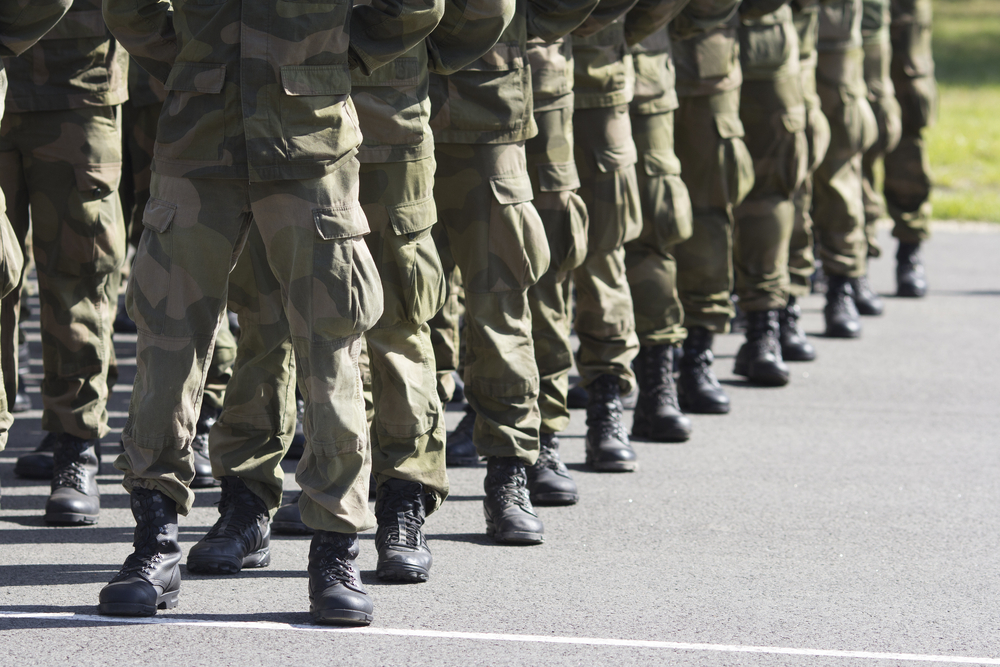Amid concerns that President Trump might order the military to act unlawfully, three experts in military law created a project to provide free legal advice to members of the military who fear they might have been given illegal orders.
One of the project founders said they hope they won’t be needed.
“The Orders Project” was born after Trump threatened to use the military against protestors in American cities and then had demonstrators tear-gassed near the White House to clear the way for him to walk to a church and hold up a Bible for cameras, according to one of its creators, Philip D. Cave, a retired Navy judge advocate.
That, combined with some rhetoric about the election and the possible involvement of the National Guard, spawned some anxiety, according to Cave.
“There were concerns and people reached out to lawyers experienced in military law to discuss their responsibilities,” said Cave, who practices law in Alexandria, VA.
RELATED: Having trouble keeping track of the Trump lawsuits? Here’s a scorecard.
RELATED: The Presidential Pardon has a long history, but Trump has changed it
Cave teamed up with Yale Law School Senior Research Scholar Eugene R. Fidell and Brenner M. Fissell, an associate law professor at Hofstra University, to create the project.
Cave said the project is operating like a hotline for worried military members.
So far, no one’s called
The good news, Cave said, is “to date, we’ve had zero calls on anything related to the hotline. … We love that. We are very happy that nothing has arisen to cause concerns or consternation.”
“Hopefully,” he added, “we can get to Jan. 21 and close up shop having had zero to do.”
They have no plans for continuing the project after Trump leaves office.
“The need of the project wasn’t necessary until this last year,” Cave said. “Assuming all is well in this country, come Jan. 21, I think Biden — or anyone else for that matter — but I think Biden would be much more cautious or responsible in how he uses the military.”
Until then, the project is there if needed.
Lawful orders must be followed
As Fidell wrote on Just Security, violations of lawful orders can carry severe penalties, including prison time and, in times of war, the death penalty.
But only lawful orders must be followed.
Illegal orders are another matter. Members of the military are not required to follow illegal orders, and in some cases, can be held criminally or civilly liable for carrying them out.
The problem comes in how to determine if an order is illegal and what to do in the face of an illegal order.
Military members also must tread lightly if they want to criticize the president because courts have held their First Amendment rights are limited by requirements of military discipline.
“Experience over the last three years, and increasingly in recent months, teaches that events may unfold in highly unpredictable ways,” Fidell wrote. “Military personnel may well be drawn into situations for which there is no precedent.
“A recently-launched non-partisan organization — The Orders Project – with which I am involved, seeks to make former JAGs available for military personnel who are unable to get advice from a uniformed lawyer in real time. With luck, there will be no need for such advice, but because events may unfold in ways that cannot be fully anticipated, it is better to have a roster of trained volunteers available than to scramble in an emergency.”
Not in the business of encouraging disobedience
Cave said he and others involved in the Orders Project are “not in the business and would not want to be in the business of encouraging disobedience. … We understand orders are orders and they have to be obeyed.”
Rather, he said, they’re concerned with the narrow issue of the unlawful use of the military against civilians and other possible misuse of the armed forces by President Trump.
Cave said the project has assembled a list of lawyers willing to volunteer their services to help worried military members. The project participants have extensive backgrounds in the military; many are retired after long military careers.
Cave said members of the military should be able to rely on their chains of command and legal officers, but some are reluctant to do so for different reasons. Among those reasons is not wanting to call negative attention to themselves.
Courts have ruled in these cases
The project also has published a sourcebook for lawyers defending military personnel that provides information about the law and leading court cases.
The cases give a sense of the issues faced by the military and how these incidents have been woven throughout U.S. history, as far back as the presidency of John Adams:
U.S. v Calley
William L. Calley Jr., a first lieutenant in the Army, was convicted of the premeditated murder of 22 infants, children, women and old men and of assault with intent to murder a 2-year-old child in the village of My Lai in South Vietnam on March 16, 1968.
Calley’s commanding officer allegedly ordered him to kill everyone in the village, the sourcebook notes. But the Court of Military Appeals ruled that anyone should realize that an order like that is illegal. And if Calley knew the order was illegal, then the order was no defense to the criminal charges.
U.S. v. Howe
At the other end of the spectrum was Henry H. Howe Jr., a second lieutenant in the Army who participated in a demonstration against President Johnson and the war in Vietnam. His conviction for using contemptuous words against the president and conduct unbecoming an officer was upheld.
The courts denied his First Amendment argument, holding that his conduct was a clear and present danger to discipline within the armed forces, according to the sourcebook.
Little v. Barreme
The oldest U.S. case of a military person held liable for obeying an illegal order is the 1804 case of Naval Captain George Little. Acting on orders given by President John Adams, Little seized a Danish ship, the Flying Fish, as it was sailing away from a French-controlled port in Haiti.
Adams had ordered the seizure of American vessels and ships suspected of being American that were going to or from French ports. But the law authorized the seizure only of American ships heading toward French ports. And Little had a copy of the law when he seized the Danish vessel coming from a French port.
The U.S. Supreme Court unanimously held Capt. Little liable for carrying out an illegal order and required him to pay civil damages to the ship’s owner.
U.S. v. Rapert
The most recent case cited by the sourcebook is that of Army Specialist Eric L. Rapert, who was court martialed for making comments deemed to be threats against President Obama when Obama was re-elected in 2012.
According to the military appeals court opinion, a witness testified that Rapert used the N word to refer to Obama and said he was going to “break out my KKK robe that was handed down to me by my grandfather and go put one order up and make it my last order to kill the president.”
A Secret Service agent testified that Rapert admitted making “several statements claiming to be a member of the KKK and that he was planning on going back to Missouri and giving an order to lynch President Obama, hang him from a tree and cut his throat.” But Rapert also claimed the statements were “completely meant as harmless jokes,” the agent said.
There was no evidence that Rapert had any connection to the Ku Klux Klan.
The court held that Rapert was not protected by the First Amendment.
Contact Elaine Silvestrini at [email protected]. Follow her on Twitter at @WriterElaineS.












